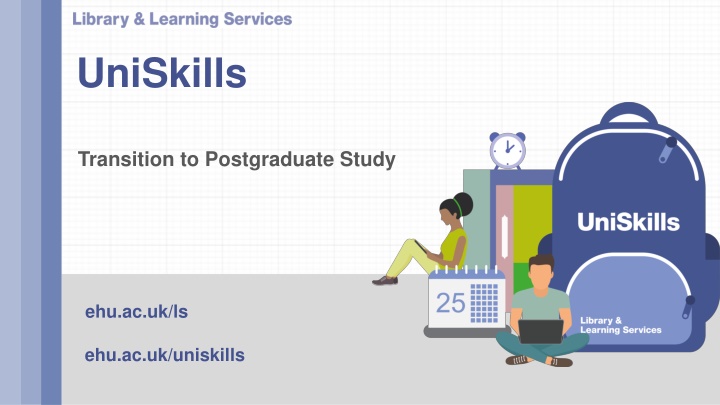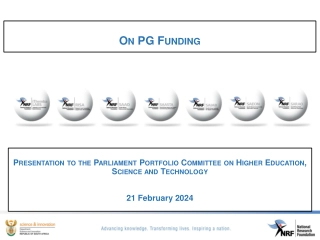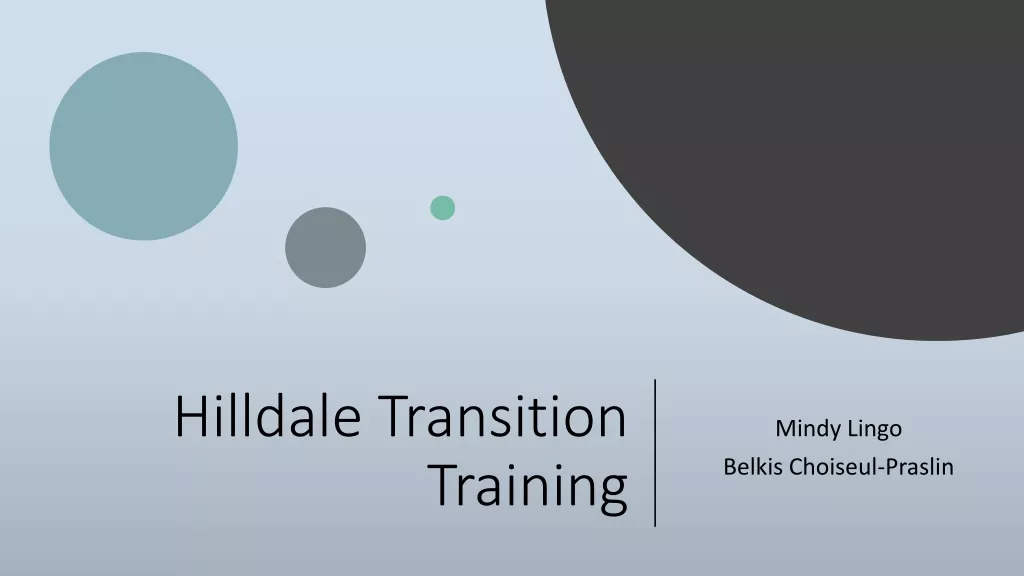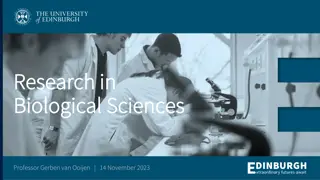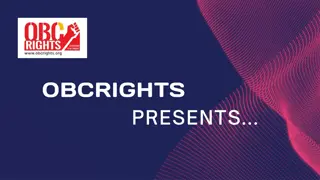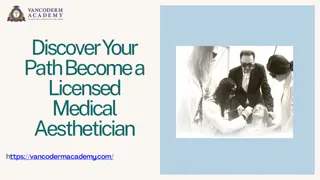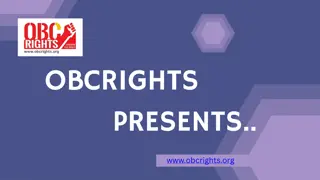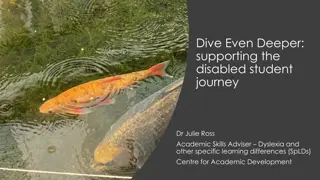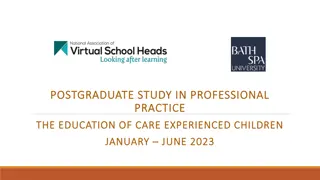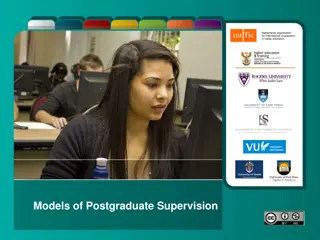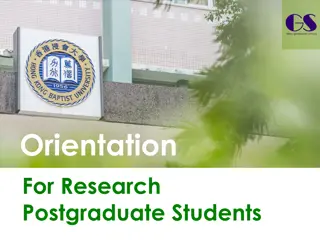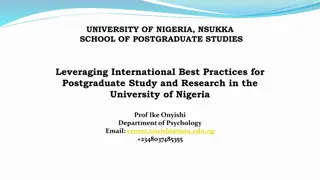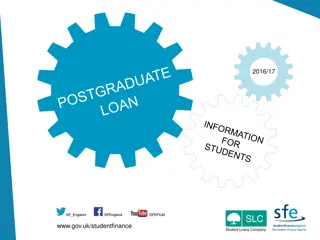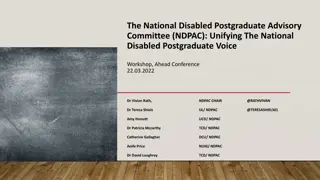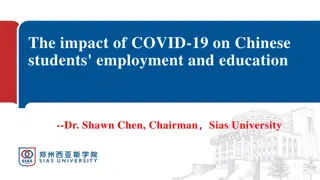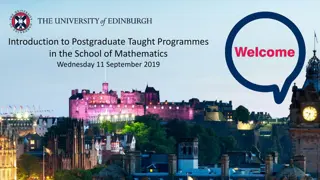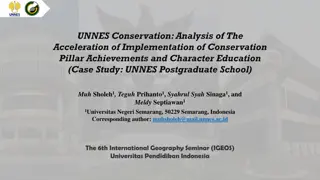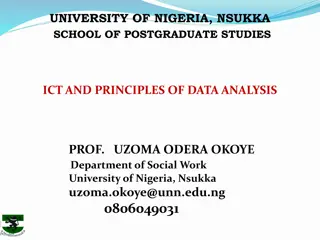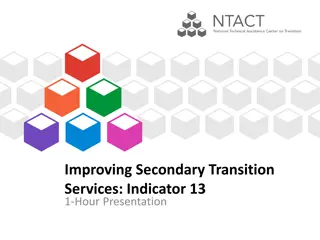Advancing to Postgraduate Study: Key Considerations and Transition Tips
Explore the transition from undergraduate to postgraduate study, reflecting on gained skills and areas for development. Learn about critical reading, writing strategies, and accessing support for postgraduate success. Discover the differences in proficiency, autonomous learning, intensity, and working relationships at the postgraduate level.
Download Presentation

Please find below an Image/Link to download the presentation.
The content on the website is provided AS IS for your information and personal use only. It may not be sold, licensed, or shared on other websites without obtaining consent from the author.If you encounter any issues during the download, it is possible that the publisher has removed the file from their server.
You are allowed to download the files provided on this website for personal or commercial use, subject to the condition that they are used lawfully. All files are the property of their respective owners.
The content on the website is provided AS IS for your information and personal use only. It may not be sold, licensed, or shared on other websites without obtaining consent from the author.
E N D
Presentation Transcript
UniSkills Transition to Postgraduate Study ehu.ac.uk/ls ehu.ac.uk/uniskills
Overview of session Reflect upon skills gained from undergraduate study Recognise the skills to be developed during postgraduate study Consider critical reading and writing strategies for PG success Understand the opportunities available for accessing support.
The step up- discussion Activity - Individual reflection Are you directly progressing, having recently studied an UG degree, or have you had a period of time away? Did you access Academic Skills support during your UG degree? What do you perceive the "Step up" to be? How is PG study different?
The step up- 2 main differences Level of proficiency and Specialist knowledge. You have the grounding in a subject and will now be required to fully explore your chosen subject in order to become proficient at a much higher level.This provides a wonderful opportunity to become a specialist in your area of discipline. You will read extensively and carry out research whilst contributing towards your field. Autonomous learning. Being an independent learner is a skill you will have already refined in your undergraduate study. However, whilst you may have relied on predominantly secondary sources for your assignments, you will now develop as an expert in your field through opportunities of independent inquiry, review, dissertation, or critique at Master s level. All of this means you are in control and will be required to manage your time effectively and work independently in a way that you never have before.
The step up- other considerations You will start to work at pace as the intensity increases. There is a need to be more meticulous, rigorous and professional. You must begin to apply your thinking. Don t aim for perfection. Instead focus on development. Take feedback constructively and take it steady. Don t try and fix everything at once. Utilise time management tools with milestones and timeframes from the start (Niyaka, 2018) and try to stay organised with notes/ files.
The step up You might find studying at PG level means you have the opportunity to have a different working relationship with your tutors. Use this resource! Establish yourself within that academic community Discuss your ideas with fellow researchers and your tutors Remember, you are studying something they too are likely passionate about.
Why do I need to read and evaluate critically? At Post Graduate level, tutors will look for depth of inquiry. It is important to move beyond the course materials on your reading list. Aim to identify important themes and issues and think more critically about your reading and selection of resources. Expect to identify, appraise and critically evaluate sources, Expect to make use of a variety of scholarly and research literature to support your opinion, judgement or argument
Finding sources Studying at PG level involves refining those skills of identifying, locating and managing wider sources. You will now have longer assignments, projects and dissertations. Consider: Subject specific databases Conference papers and theses Setting up automatic alerts when new journal articles are published in your field
Where should I look? Using Discover More Searching for Books, eBooks and journals.
Searching Use the Subject Resources for additional reading and research. https://www.edgehill.ac.uk/departments/support/ls/subject- resources/
Evaluating your results and getting a critical focus P R O M P T
Activity Activity - - Imagine you are writing a response to Imagine you are writing a response to this title: this title: Single-use plastic reduction at UK higher learning institutions: Motivations and best practice You find a journal article. How useful and relevant would this be?: Focus on Southampton as HE provider Accepted 2010/ online 2011 Qualitative interviews and structured kitchen observations as method Participants 8 kitchen managers and 3 sustainability staff Focused on sustainable packaging and waste recovery of food packaging Research carried out by School of Civil Engineering and Environment- waste and facilities management Findings- staff had difficulty understanding the impact of packaging choice on waste reduction and recovery- need for behaviour change
Plan to be critical when reading Source Number of participants 20 Key themes- look for patterns LO Areas for criticality TO, J. 2016., This is not what I need : conflicting assessment feedback beliefs in a post-secondary institution in Hong Kong. Research in Post-Compulsory Education. 21 (4), pp. 447-467. Assessment feedback 2 Small number of students Feedback resilience Hong Kong base relevant to a UK context? Addressing feedback VAN DER KLEIJ, F. M., 2019. Comparison of teacher and student perceptions of formative assessment feedback practices and association with individual student characteristics. Teaching and Teacher Education. 85, pp. 175-189. Focused on feedback in specific 2 subjects (English & Maths) 59 teachers Assessment feedback 2 Students perceptions of feedback 186 students Australia relevant to UK? What students do with feedback Funded by Australian Catholic University implications School not university setting
Look for key themes, arguments and patterns Look for key themes, arguments and patterns Single-use plastic reduction at UK higher learning institutions: Motivations and best practice
Now you have your sources, what next? Postgraduate writing requires a greater level of critiquing and communication, in order to reflect a level of advanced scholarship. Once you ve established your audience and purpose, you will be required to present and justify your own ideas and communicate these effectively. This means being able to synthesise and critically evaluate a process and a product.
Perceptions of writing at level 7 Mountain climbing Childbirth Labyrinth Digging a well with a needle Artwork Aydin and Baysan (2018)
Perceptions of writing at level 7 learning journey unique peculiarities demanding task Wilkinson (2005)
Critical writing Engaging with academic literature and debates Being open-minded and objective Evaluating and analysing arguments and evidence instead of simply accepting the conclusions of others Recognising the limitations of evidence and providing alternative suggestions
What else is important to know for PG study? Synthesis & Integration What do you think these terms might mean?
Integration and synthesis- Integration - bringing together theory, literature and practice Bioplastics have their own complications. Bioplastics are still a relatively new material in the international market, with legislation or guidance lacking (Hann et al., 2018). This point, reiterated by Wilson (2019), stresses that the conditions under which bioplastics can biodegrade are not communicated well and given the stark differences between industrial composting and other processes, consumers may discard an item incorrectly with the belief it will completely degrade. Synthesis - inferring relationships between different sources A reasonable number of studies have been conducted into the measures that higher learning institutions are taking to become more sustainable. However, these focus more broadly on recycling and waste management (Tangwanichagapong et al., 2017; McCoy et al., 2018; Smith, 2019)
Be aware of accuracy and complexity You now need to be more thoughtful about the way you write and the words you choose. However, remember to be clear and concise. At PG level, you cannot mask vague understanding of a concept, issue or debate. You are expected to interrogate borders, assumptions and boundaries and understand that academic knowledge is a complex network of views rather than two clear sides.
Your Academic Voice Academic Phrasebank produced by The University of Manchester provides useful examples of phrases written in academic English . External websites provided by 3rd parties are not associated with Edge Hill University. It is recommended that they are used at the individual s discretion.
Putting it all together Might be useful to follow a structure Isn t a one size fits all assignments but a useful starting point. What are your non negotiables?
Achieving criticality in writing Statement-focus Expand Evidence Develop -with criticality So what?- with criticality, synthesis and/or integration. What next?-with criticality
Putting it all together Statement- focus It has been suggested that contamination of terrestrial ecosystems is a much bigger issue than reported. Expand This pollution has been traced to a number of sources with the main issue being the presence of microplastics. It has been reported that 80-90% of microplastics in sewage are retained in the sludge and used as fertilizer (Horton, 2017; Talvitie et al., 2017) This could be up to 23 times more than in oceans (Nizzetto et al., 2017). Evidence with synthesis and integration Evidence shows that, yearly, this could equate to as much as 63,000 tonnes of microplastic into agricultural land (Nizzetto et al., 2016). However, this only takes Europe into consideration. Additionally, road verges have been found to contain up to 7% microplastics by mass and as microplastics may persist for well over 100 years. Additionally, concentrations will continue to rise although the research is lacking in terms of projections (Fuller and Gautam, 2016; Horton et al., 2017). Develop with criticality So what?- with criticality and integration. It must be noted, however, that additional research into all these areas is needed and a worldwide focus rather than specific geographical attention will provide more insight into the extent of the problem. Equally more funding is needed at a governmental and international level to address the risk to ecosystems. What next?
Technologies for Proofreading Use Editor to check for formality Hear web pages and documents read aloud. Use Read Aloud to hear your work read back to you with simultaneous highlighting. Use find and replace for any contractions Use Editor to check for spelling and grammar errors Understand unfamiliar words with text and picture dictionaries. Breaks words into syllables to promote concentration. Helps to remove informality. Use Editor to check for clarity and conciseness Develop writing skills with word prediction. Helps you to check the fluency of your work. Helps you to establish a more academic tone. Use Editor to check for punctuation conventions Supports spelling with similar word checker for homophones. Makes editing much easier. Saves time in long documents.
Research If you are a taking a taught or research-based masters course, then you will likely be asked to present a dissertation that includes research and data from a project of your own design. You will need to be aware of: What you are doing Why you are doing it What you want to find out What is the best method for finding it out You will be expected to interpret your own research findings and propose solutions or recommendations.
Further support Discover information, guides, videos and toolkits on our webpages Book your place on a UniSkills webinar or workshop running throughout the year Book an appointment with UniSkills for 121 support Contact the Catalyst Helpdesk via email at CatalystEnquiries@edgehill.ac.uk, search our FAQs or Ask a Question online Explore LinkedIn Learning to access online courses and video tutorials, written by industry experts, to help develop your skills and boost your employability Attend 3 UniSkills workshops and/or webinars to gain 10 activity points towards the Extra Edge Award
Keep in touch @EHULibrary @EHULearnService edgehill.ac.uk/uniskills Blogs.edgehill.ac.uk/ls
